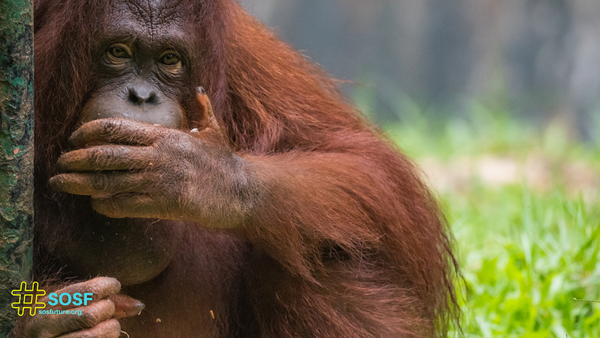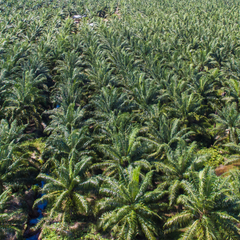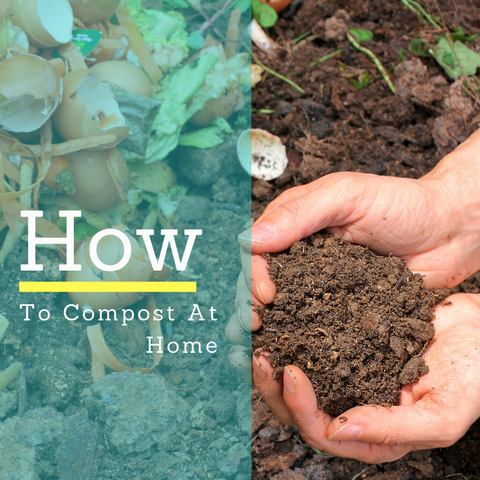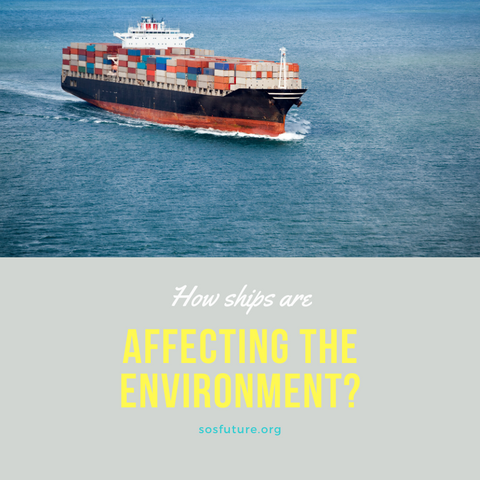How does palm oil destroy forests and orangutans? What we can do to prevent it?

What and Where is Palm Oil?
The oil palm tree (Elaeis guineensis) was imported into South Eeast Asia in the mid 19th century, but it is actually native to West Africa. Oil palm trees flourish in a humid tropical climate and produce higher yields when grown close to the equator. The oil palm tree only requires approximately a 3 metre diameter around the base to allow full growth. The small area required for growth mean that the oil palm tree is capable of producing more oil from less land than any other vegetable oil in existence, which makes it a high yield crop from a land-to-yield ratio perspective. There are two forms of oil from the Palm Oil Plant. Palm Oil (PO) is obtained from the flesh of the fruit, while Palm Kernel Oil (PKO) is produced by extracting the oil from the internal seed.
 Palm Oil is found in around 50% of products purchased and is used by many people on a daily basis. Palm Oil and derivatives are used in the manufacture of baked goods, prepackaged foods, cleaning products, hair care, cosmetics, soaps and personal care items. Palm Wax is used in the manufacture of candles.
Palm Oil is found in around 50% of products purchased and is used by many people on a daily basis. Palm Oil and derivatives are used in the manufacture of baked goods, prepackaged foods, cleaning products, hair care, cosmetics, soaps and personal care items. Palm Wax is used in the manufacture of candles.
Today, Indonesia and Malaysia account for around 87% of global palm oil production and the demand for palm oil continues to grow as it is a relatively cheap and fast oil to produce.
The Environmental Cost of Palm Oil
Indonesia is being deforested faster than any other country in the world, and it is all because of one product: palm oil. The World Wide Fund for Nature (WWF) has suggested that ‘about 300 football fields of forest are cleared every hour’ across the globe to make way for palm oil plantations.
 The destruction of large areas of tropical forests to make room for oil palm plantations involves destroying biodiversity, wildlife and natural ecosystems. Deforestation is not only causing devastation to plants and wildlife, but it is also a major contributor greenhouse gas emissions. This is because the cheapest and fastest way to clear land for plantations is to ‘slash and burn’. Fires in Indonesia produce immense pollution, sending smog to cities hundreds of miles away.
The destruction of large areas of tropical forests to make room for oil palm plantations involves destroying biodiversity, wildlife and natural ecosystems. Deforestation is not only causing devastation to plants and wildlife, but it is also a major contributor greenhouse gas emissions. This is because the cheapest and fastest way to clear land for plantations is to ‘slash and burn’. Fires in Indonesia produce immense pollution, sending smog to cities hundreds of miles away.
It is estimated that over 50 Orangutan are killed every week due to deforestation. There are three species of orang-utan and they are all listed as Critically Endangered by the International Union for the Conservation of Nature. However, the orangutan are often considered a pest by many the oil palm companies because they get in the way and may destroy young palm plants when foraging for food. There have also been reports of elephants and other native wildlife being poisoned by palm oil companies.
 The devastating situation for orangutans was highlighted in an advertisement intended for British TV, where a young girl learns of deforestation in Malaysia and Indonesia from a homeless organutan called “Rang-tan”. The Ad was created to showcase the efforts of a British Supermarket Chain to create a ‘no palm oil’ range of products. Interestingly, the Ad was banned in the United Kingdom for being too ‘political’.
The devastating situation for orangutans was highlighted in an advertisement intended for British TV, where a young girl learns of deforestation in Malaysia and Indonesia from a homeless organutan called “Rang-tan”. The Ad was created to showcase the efforts of a British Supermarket Chain to create a ‘no palm oil’ range of products. Interestingly, the Ad was banned in the United Kingdom for being too ‘political’.
Avoiding Destruction from Palm Oil
There are two main ways consumers can avoid supporting deforestation caused by palm oil.
The first way is to avoid buying products that contain palm oil as an ingredient. As there are over 200 different names for Palm Oil based ingredients and derivatives, this option requires a little bit of education and preparation. The second option is to buy products that use ‘sustainably produced palm oil’. Certified Sustainable Palm Oil (CSPO) has been produced in plantations that are well-managed with good environmental, social and economic standards. CSPO plantations can only become certified if they are sourced from plantations that were established on land cleared before 2005, which helps to avoid continued and unrestrained deforestation.
Either option means you are no longer supporting mass habitat, forest and wildlife destruction. In the meantime, you may wish to support an orangutan and wildlife rescue organization.
TO HELP US CONTINUE WITH OUR MISSION YOU CAN:
Thank you, thank you, thank you, we could not do it without you!
DONATE :
BUY ONE OF ECO-FRIENDLY PRODUCTS:
YOU MAY ALSO LIKE:
How Recycling helps the environment
Pollution and ways to prevent pollution
How to be More Eco-Friendly
How Bad Are Pollutants Affecting The Ecosystem?
How To Compost At Home?
What you need to know about plastic breakdown
How ships are affecting the environment
How To Detect Shark In Our Daily Products?
20 Zero Waste Resolutions For 2020
The Alarming Effects Of Pollution On Coral Reef





